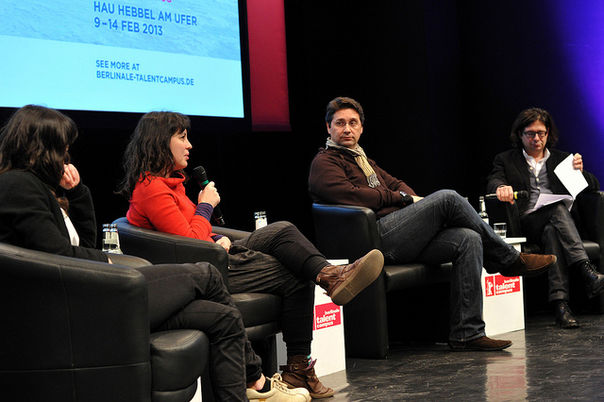IDENTITY CRISES
Three filmmakers from Southern Europe report on their experiences making art in a time of crisis.

The Campus panel “Pride and Prejudice: Southern European Filmmakers Report”
On the heels of three successful premieres at the 63rd Berlinale, directors Salomé Lamas, Elina Psykou and Thanos Anastopoulos got together to discuss their work in the context of the crisis hitting Southern Europe, one that, while social and economic in nature, is also a crisis of identity.
Moderator Vincenzo Bugno opened the Berlinale Talent Campus discussion “Pride and Prejudice: Southern European Filmmakers Report” with a brilliant analogy: “A crisis is like emotional blackmail”. Turmoil forces filmmakers into a context in which their work is bound to be interpreted as either involuntary response or active resistance. Portuguese filmmaker Salomé Lamas – shy, but brimming with insight – spoke eloquently of her film NO MAN’S LAND. By letting her subject tell his own life story, Lamas manages to blur “the borders between storytelling, remembering and history,” challenging “the way history crystallises into a fixed totality”.
Psykou followed, discussing some of the more humorous segments of her excellent debut, THE ETERNAL RETURN OF ANTONIS PARASKEVAS. One moment in the film finds its eponymous protagonist – a famous anchorman who has just orchestrated his own kidnapping – nostalgically looking at footage from the inauguration of the Euro in Greece. The historical reference becomes a source of dark humour. As Psykou observed, Greece was “the first country to get the Euro and perhaps the first country to lose it.”
Thanos Anastopoulos spoke last, loudest and longest. Regarding his character-driven, personal film THE DAUGHTER, he said that “a moral crisis always precedes an economic one”. The talk closed with an insightful discussion on financing and distribution in times of strife. Anastopoulos called the cutting of funds for the arts a form of dictatorship, “silencing our ability to create art about what is in front of us”. Under these circumstances, however, filmmaking becomes a form of resistance.

